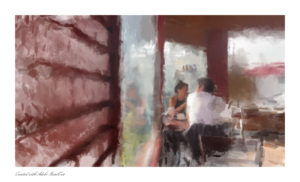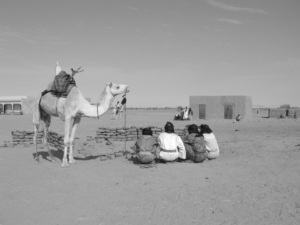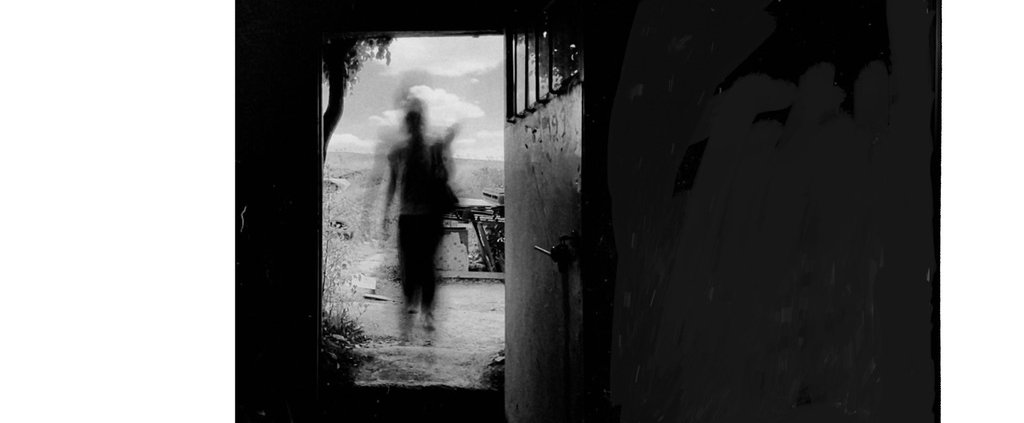My old answering machine had only one message on it that afternoon.
“Helloo, is that Reuuuben? My name is Val’ry and… um… Ian at Abel CineTech recommended you for a project—a film—we’re planning to shoot quite soon in Mahlee. Would you please call us back at your earliest convenience to discuss?”
She added her phone number, using “double otts” instead of zeroes. Beep. The message ended.
One vowel was the difference between a tropical Hawaiian paradise and a landlocked West African country. I stood there replaying the words in my head, trying to decipher the British tones.
It was one of those calls you feel in your gut, or your chest, or wherever that mysterious place is where excitement and anxiety live side by side.
Ahh, the siren call of distant lands. The magic of the unknown. The tantalizing chance this might actually be a real project. And the equally real chance that it wasn’t.
Someone at the other end of the line is saying, There’s something happening here. You want in?
I called my friend Ian, who’d recommended me. He was vague—said he didn’t know much, just that it sounded like something I’d be perfect for. He added, almost as an afterthought, “They could probably use a lot of help.”
That was enough to trigger that familiar tug in my gut—the restless mix of curiosity and wanderlust that pulled me into documentary filmmaking in the first place. Over the years, I’ve learned that the most interesting projects often begin as whispers. A message. A chance encounter. A gut feeling.
It’s not just about answering the call. It’s about listening to what’s really being said.
Was there a story here? A good character? A moment in history asking to be seen? A budget that might actually support the effort?
I hate to say it, but when the person calling has a British accent like Valery’s, odds are higher it’s a fishing expedition. There’s something clubby about the Brits. They ask a lot of good questions, charm you over coffee, and then bring their own crews to location. But they’re so polite about it, it’s hard to get mad.
I played her message again, listening for clues. Her accent was sharply British—boarding-school polished, I’d guess. That meant she likely came from money, and if she’d chosen non-fiction filmmaking, it might actually be for the right reasons.
There was a tone in her voice I couldn’t quite place. It could have been seriousness, or maybe inexperience. Urgency, definitely—and that’s not always a good sign. People making a solid film don’t usually call last-minute to find a director of photography. Not unless they’re putting out fires, or have no idea what they’re doing. Neither option is comforting.
Still, she was talking like the project was already happening. Which suggested that some level of funding had to be in place.
You’d think that verifying funding would be a simple task—either it’s there, or it’s not. Turns out, not so. The perception of what constitutes “funded” changes wildly from person to person. But funding—that deserves its own chapter.
For now, I called her back, and we agreed to meet for lunch. A café. A conversation. A chance to check each other out.
To see if we were a fit.
Oh, did I say it was Mali…not Maui?
The Coffee
A few days after the message on my answering machine, I met Valery and Holly at a café to talk more about the project. It was a late-morning meeting, casual and open-ended. The kind where you size each other up and wonder if you’re going to step into something major together or just nod politely and walk away.
I’m not great at describing people’s appearances, and I’m worse at guessing ages, but they both struck me as being in their forties. Neither of them struck me as the pampered, lean and mean film producer-from-Los-Angeles type. They had a kind, low-key presence. Valery, the British-accented producer, was sturdy and composed. Holly, the director, had a birdlike frame and a smile that seemed to have been with her since childhood—wide, bright, and ever-present. They had an ease with each other that made me think they might be lifelong friends, or perhaps something more. Whatever the nature of it, there was a strong bond between them, and a sense of shared conviction.

I mostly listened initially, sipping my cappuccino and jotting down a few notes while they spoke. Their story sounded like something out of an old adventure novel, the kind with slightly yellowed pages and a camel on the cover. I could feel my interest growing.

According to them, Mali was home to tens of thousands of ancient Islamic manuscripts—sacred texts, Holly called them—handwritten by scholars from the 10th century to the present day. The writings, they said, held a kind of spiritual and practical wisdom that the modern world had all but forgotten. These manuscripts were now in danger—threatened by decay, sand, neglect, and perhaps more immediate dangers they hadn’t yet named.
Their sense of urgency was real, even if their storytelling was a bit breathless.
Still, I was already beginning to see the film in my head. I pictured robed scholars hunched over low wooden tables, candlelight flickering on leather-bound pages. Outside, camels stood tethered under a desert moon, making those strange gurgling noises camels make while truth was quietly being recorded inside.
“Back then,” they informed me, “Timbuktu was called the ‘Athens of Africa.”
Valery and Holly wanted to make a feature-length documentary—one that would play in movie theaters. That raised the stakes considerably, but I didn’t flinch. It sounded ambitious, but not impossible.
They seemed to like me, but my involvement wasn’t assured yet. So before we wrapped the meeting, I broke the moment with a smile and took a chance by saying, “Isn’t this the part where you say, ‘So Reuben, tell us something about yourself’?”
Holly’s grin widened. “ So Reuben, tell us something about yourself.” My request could have been considered to be cheeky by them or maybe something else.
I told them about a project I’d once pitched to National Geographic about an annual caravan of camels bringing gold freshly mined in the desert to be sold in Timbuktu. A different story entirely from theirs, but I thought they’d surely looked up my resume by then and might enjoy hearing that I’d already been interested in doing a film in Mali.
Contents
Are Those Little Flags Slightly Red in Color?
We met at Holly’s house a few days after I’d been officially hired for the project. A meeting, largely due to my urging. I was about to go on a shoot in Mexico and I wanted to move our initial conversations along by talking out some of the details of the project both big picture and small as well as getting to know these women better since the odds were looking like we were going to spend a lot of time together in fairly close confines of tents and vans.
My role in a project like this will expand or contract enormously in direct proportion to how much I sense my skills are required to help ensure that the producers get everything they are hoping for. I wasn’t yet sure about either Valery or Holly as far as their skills as filmmakers, and I thought this meeting might be a good opportunity to explore some of the missing elements.
It used to be that the filmmaking community was a small one, and everyone pretty much knew everyone else. But the universe of known and wannabe non-fiction filmmakers had expanded enormously in the past dozen or so years, along with a proliferation of film schools. Nowadays, it seems anyone, with or without prior experience, could step forward, raise their hand, and call themselves a filmmaker.
Valery, met me at the door. As I took my shoes off and put them next to a small pile of others, I could hear Holly on the phone with someone inside. I learned at our lunch that Valery had recently moved back to Los Angeles from the East where she was a music producer. She and Holly, it seemed, were old friends.
The entrance and the living room – just off to the right – were very comfortable looking with a sense of order and balance. Tasteful photos on the walls were a nod to things spiritual.
Ashley arrived with a tray with lots of great things to nosh on, including hummus dip and eastern-style Syrian flat bread and small Israeli-style salads. Good food, always a good sign.
These early meetings are essential. The more prepared we all are in advance of any shoot, especially overseas, the better job we can do. Shooting as far away as Mali permits us one flight over and one flight back. We can’t just stop shooting because we left something back home and wait in the middle of nowhere for Federal Express to fly it in. Nor can we order up more tape stock halfway through the process, hours away from a city that wouldn’t have videotape anyway much less electricity or a telephone. The critical choices we make about what to bring with us and what to carry as backup equipment will evolve directly out of the kinds of information that comes from this very kind of meeting taking place comfortably in advance of our leaving dates.
The quality of the film we make will depend on these meetings.
I had mentioned a few days earlier that it might be nice if I could see some of Ashley’s previous projects as a way of getting to know her work. Past is prologue. This is something I try to do before any project like this when I’m working with someone for the first time. In my attempts to Google both Valery and Holly, I’d come up with almost nothing. This wasn’t a good sign. You absolutely can’t make a film like the one before us by simply wanting to. Hopefully, she had the passion and the instincts to surround herself with talented, experienced people to help overcome the many challenges ahead of u,s no matter what the level of their prior experience.
After our café meeting, I agreed to show Valery and Holly some of my work, and they offered to share samples of theirs.
The clips they played me came from magazine-style TV shows—segment-driven, often with on-camera hosts. None of it was bad, exactly. But none of it stood out. It had that polished, generic tone: information delivered cleanly, but stripped of nuance or tension. Everything reduced to bite-sized narration, spoken in the kind of friendly but hollow tone that says, “Don’t worry, this won’t make you think too hard.” I found myself wishing for some poetry. Or heart. Or anything that made it feel real.
I’d brought a DVD of my work to show them. Holly didn’t have a DVD player in her office, so Valery led me into one of the guest bedrooms, where she had a huge Macintosh computer set up.
Excited to show it off, the monitor was massive—by far the largest I’d seen at the time. She gestured toward it like she was unveiling a new baby. I admired it, genuinely. It was a beautiful machine.
But the room itself? The room was a mess.
Boxes, cords, piles of paperwork. The chaos stood in sharp contrast to the rest of the house. And for a split second, there was an unspoken recognition of the scene as she saw me seeing it.
“Just getting settled in,” she said quickly. “Gotta get this place organized.”
I smiled and nodded, but in the back of my mind, I began to wonder if this project might be disorganized as well.
Gesturing to the monitor, I asked, “But you’re not thinking of bringing that with us to Mali, are you?”
“Of course not,” she replied. But I caught the hesitation in her voice, as though she hadn’t really considered not bringing it.
In my head, I pictured a Malian fixer trying to wedge that screen into the back of a dust-covered Land Rover, delicately sliding it between a tripod case and a tangle of cords. “Okay if I put it here, Miss?”
I showed them a few selected segments from several of my films. At the end, their responses confused me. Maybe they were intimidated by the work for some reason. What was not being said by them?
I started to wonder if they were intimidated. Not by me personally—though I’ve been told I can come across as intense, but by the pressure of having to appear knowledgeable when they weren’t yet confident.
And that’s what began to worry me. The sense that we weren’t actually talking about ideas. That they were nodding to move things along, rather than because we were aligned.
In filmmaking, that can be poisonous.
In one moment, you think you agree. But later, the follow-through vanishes. Tasks don’t get done. Decisions dissolve. And when you circle back, you’re left wondering whether there was ever real agreement at all.
But maybe I was getting ahead of myself.
Secret texts? Ancient wisdom? Tuaregs in robes? Camels beneath the moon?
I was so into the potential of this project.
Even with red flags fluttering in every direction, I told myself I could help them. That I could guide this project with experience and clarity. That my faith in the story was enough to outweigh the warning signs.
Like stepping into a relationship knowing full well that your good intentions probably won’t be enough.
And doing it anyway.



